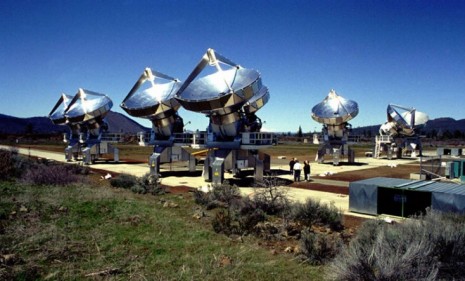Is the U.S. too broke to search for aliens?
Short on funds, the SETI Institute temporarily shuts down its Allen Telescope Array, which had been used to hunt for alien life forms

A free daily email with the biggest news stories of the day – and the best features from TheWeek.com
You are now subscribed
Your newsletter sign-up was successful
America's search for extraterrestrial life has been put on hold due to a lack of funding. The SETI Insititute, a not-for-profit organization based in California, has been forced to temporarily shut down its Allen Telescope Array, a group of 42 radio dishes used to listen for alien transmissions. The array costs $1.5 million a year to operate, but budget cuts in California and at the National Science Foundation have led SETI to put the array into "hibernation." What do these financial woes mean for the search for E.T.?
This is really pathetic: Given the widespread budget crisis, it's "no surprise" that this initiative is getting scrapped, says Phil Plait in Discover. But it still "sucks" because "SETI represents something noble and good about science." Adding "salt in the wound" is that for "the first time in human history," we're now finding lots of planets outside our own solar system that could be habitable and SETI "was just ramping up" to start giving them a listen.
The Week
Escape your echo chamber. Get the facts behind the news, plus analysis from multiple perspectives.

Sign up for The Week's Free Newsletters
From our morning news briefing to a weekly Good News Newsletter, get the best of The Week delivered directly to your inbox.
From our morning news briefing to a weekly Good News Newsletter, get the best of The Week delivered directly to your inbox.
SETI belongs on the scrap heap: SETI's idea "had its day," but it's "silly" to think all such projects should continue forever, says Hank Campbell at Science 2.0. In any case, the whole idea of searching for radio noise from faraway planets is questionable, because it means "alien civilizations would have had to have sent radio signals thousands of years before they even knew we would invent radio. And only if they invented radio."
"SETI shut down — aliens who sent radio signals 400 years before radio was invented will be disappointed"
The search lives on elsewhere: The Allen Telescope Array is the best and "most important SETI installation," but it wasn't alone, "and that keeps alien hunters from despairing completely," says Michael D. Lemonick in TIME. There's a giant radio telescope in Puerto Rico. A Harvard astronomer is looking for aliens "that might communicate with lasers rather than radio beams." And foreign countries, such as Italy, are also on the lookout for E.T. So there's some hope yet.
"ET, call us — just not collect"
A free daily email with the biggest news stories of the day – and the best features from TheWeek.com
-
 How the FCC’s ‘equal time’ rule works
How the FCC’s ‘equal time’ rule worksIn the Spotlight The law is at the heart of the Colbert-CBS conflict
-
 What is the endgame in the DHS shutdown?
What is the endgame in the DHS shutdown?Today’s Big Question Democrats want to rein in ICE’s immigration crackdown
-
 ‘Poor time management isn’t just an inconvenience’
‘Poor time management isn’t just an inconvenience’Instant Opinion Opinion, comment and editorials of the day